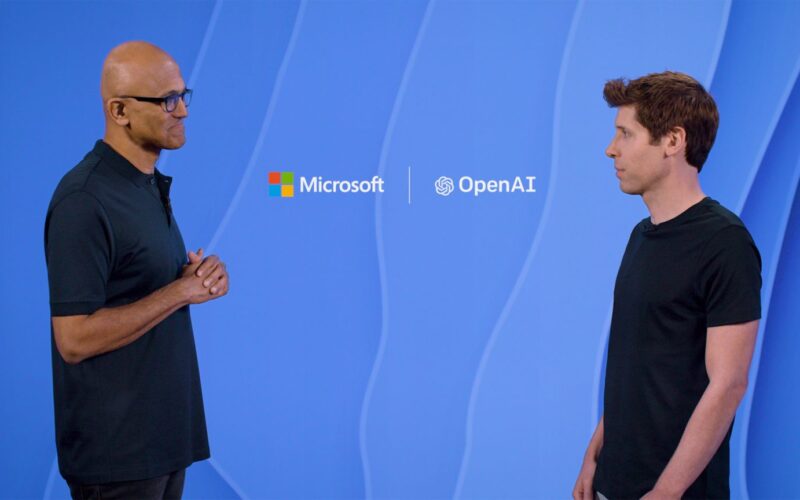From medtech to fintech, Artificial Intelligence (AI) is rapidly transforming our world, with the potential to revolutionise industries and fundamentally alter how we live our lives.
Whether it be self-driving cars or smart homes, AI has infiltrated nearly every aspect of modern life – and its influence is growing every day. In recent years, AI tools have become more sophisticated and are now being used to help individuals and organisations in various ways.
One such tool that has developed a buzz in recent times on the Internet is none other than ChatGPT, developed by OpenAI. The tool has quickly grabbed attention for its detailed responses and articulate answers across many knowledge domains.
Realising the tool’s potential, Redmond giant Microsoft has decided to invest $10B in OpenAI at a valuation of $29B. However, it needs to be made clear whether the deal is finalised.
As a part of the funding, Microsoft will reportedly get a 75% share of OpenAI’s profits until it makes back the money on its investment, post which the tech giant would take a 49% stake in OpenAI.
Elon Musk among the founders
OpenAI is a San Francisco-based research company devoted to advancing artificial intelligence (AI) technologies in the way that is most likely to benefit humanity.
Founded in 2015 by tech luminaries including Elon Musk and Sam Altman, OpenAI’s mission is to “solve the problem of AI alignment — how to make sure that as we develop AI, it works in the interest of humans.”
The company is focusing its research on general AI – a form of AI technology with applications across many fields and industries. OpenAI’s projects include developing new algorithms that can be used for machine learning, robotics, natural language processing, and more.
Last year, OpenAI launched ChatGPT to the public in November. After five days of release, the chat research tool crossed 1M users. In fact, Sam Altman took to Twitter to share the news.
As OpenAI is set to get considerable funding, we have listed five exciting points you should know about ChatGPT.
AI-powered chatbot
ChatGPT is an AI-powered chatbot capable of creating interaction-style conversations. ChatGPT is built on top of the GPT-3 family of large language models and is fine-tuned with supervised and reinforcement learning techniques.
The dialogue format allows ChatGPT to answer follow-up questions, admit mistakes, challenge incorrect premises, and reject inappropriate requests.
Currently, the service is free; however, Sam Altman has hinted about plans to monetise the service later.
ChatGPT costs a BOMB
While we are experiencing ChatGPT for free, OpenAI is spending a fortune to keep it up and running. OpenAI co-founder Altman in a tweet, says, “the compute costs are eye-watering.”
Well, how much at maximum can it be? According to Tom Goldstein’s estimate, an Associate professor at Maryland, it takes around $100,000 to run ChatGPT per day and $3M monthly.
According to Goldstein, ChatGPT is hosted on Microsoft’s Azure cloud, which charges $3 an hour for a single A100 GPU and each word generated on ChatGPT costs $0.0003.
Typically, ChatGPT replies with at least 30 words hence a single response from the AI chatbot costs up to 1 cent per query.
As mentioned above, ChatGPT acquired 1M users within its first five days of operation. Therefore, if an average user has made ten queries, it is safe to say that ChatGPT serves around 10M daily queries.
Answers like human
According to OpenAI, ChatGPT was trained on extensive amounts of data written by humans, including conversations from the Internet, therefore, the responses it provides may sound like real humans.
“It is important to keep in mind that this is a direct result of the system’s design (i.e., maximising the similarity between outputs and the dataset the models were trained on) and that such outputs may be inaccurate, untruthful and otherwise misleading at times,” says OpenAI.
ChatGPT is a Google Search on steroids
According to The New York Times, Google’s management has declared a “code red” and is scrambling to protect its online search monopoly against the disruption that ChatGPT will bring. You can think of ChatGPT as a Google Search, but not exactly. And no, it’s not going to replace Google anytime soon. The speciality of ChatGPT is that it conversationally presents information in any field, including science, sports, politics, religion, and much more.
Some of the coolest things you can do with ChatGPT are:
- Develop original jokes
- Learn complex topics
- Solve math problem
- Write code
- Write music
- Relationship advice
- Write essays and more
ChatGPT, unlike other chatbots, remembers previous prompts given to it in the same conversation.
Even ChatGPT has limitations
According to OpenAI, ChatGPT is programmed not to provide harmful or toxic responses. However, the San Francisco company has acknowledged that ChatGPT “sometimes writes plausible-sounding but incorrect or nonsensical answers.”
Also, ChatGPT has limited knowledge of events that occurred after 2021.
As per BBC, ChatGPT is not yet allowed to express political opinions or engage in political activism. However, ChatGPT exhibited a pro-environmental, left-libertarian ideology when prompted to take a political stance, reports arXiv, a curated research-sharing platform.
So what do you think about ChatGPT? Do you think it will replace Google search?
Do let us know in the comments section below!















